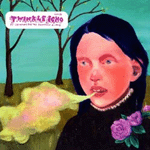|
|
 |
Dusted Reviews
Artist: Casiotone for the Painfully Alone Album: Twinkle Echo Label: Tomlab Review date: Nov. 25, 2003 |

|
|
|
 |
How can machines make us so sad? Maybe it has something to do with the disjunction between the sincerity of the human emotions expressed in the song and the cold precision of the music, or maybe everyone in the ’80s was just sad, but there’s no denying the undertow of melancholy in synth-pop. The garage-rock version of the genre has been proffered for a few years by Owen Ashworth, who records under the name of Casiotone For The Painfully Alone, using nothing more than the beats and tones within one of his many cheap keyboards to make wistful odes to lost love and sadness.
This is a charming conceit, and in places, Twinkle Echo is a winning execution of the formula. With thin, robotic samba beats and buzzing keyboard drones, Ashworth runs through the expected variations of heartbreak and disappointment, conjuring low-fi, sub-disco pop songs that clatter and bleep like broken-down new wave. Often, the music inspires sadness, but there’s something missing on many of the tracks. Songs like the opener, “To My Mr. Smith”, bounce along nicely, and the low-fi recording gives the Casio’s tones a pleasing, crunchy warmth. But the vocal melodies feel a little secondhand, a retread of indie-rock’s formal clichés. And it doesn’t help that Ashworth sometimes seems to be going through the motions of heartbreak rather than anything approaching genuine feeling.
If you’re going to do heartbreak with a detached vocal style, take care, since you have the rather large shadow of Stephin Merritt and the Magnetic Fields looming over you. Merritt’s genius lies partly in his gift for programming and arrangement, but his songs work chiefly because he has a delicate eye for detail and a fully internalized sense of pop’s mechanics. By comparison, Ashworth tells average indie tales of average indie heartbreak, inducing feelings more akin to the loss of a crush when you’re thirteen than losing the love of your adult life. Or indeed, how you once felt about the possibility of a crush. These songs don’t feel lived in so much as invented through the received wisdom of indie-rock’s laws: break-ups are sad; sadness is a given part of life; think only of yourself. This self-absorption nearly sinks the record, but Ashworth has enough songwriting smarts to occasionally transcend his own conceit and create some sturdy pop. Often, a song can be made to work simply because of the beauty of the Casio’s sound. Songs like “Jean, If You’re Ever In Portland” and “Hey Eleanor” possess gorgeous, warm keyboard parts, and use a restrained singing style that gives them an understated elegance.
Twinkle Echo, it should be noted, is not a bad album. It has a handful of excellent songs, but lyrics like “True love is hard to find” simply won’t cut it, at least not if you’re any older than fifteen. Ashworth has a wonderful command of his instrument, and is able to produce some innovative music. But it’s important to remember that although we’re hardwired to weep at the sound of a beatbox and some keyboards, we’re not suckers, and we won’t cry for just anyone.
By Jason Dungan
|







